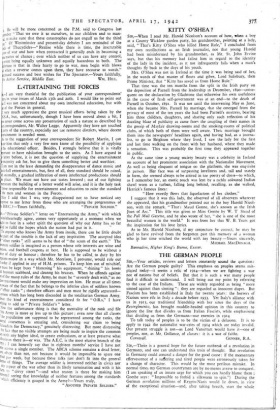SIR,—There is a general hope for the future outbreak of
a revolution in Germany, and one can understand this train of thought. But revolution in Germany could conceal a danger for the good cause: if the momentary effervescence of a suffering and tired people were erroneously taken for a change of character. This would be the most perilous mistake. In normal times my German countrymen are by no means averse to conquest. (I am speaking of an innate urge for which you can hardly blame them ; Goethe says: "Impossible to forbid a silkworm to spin.") During the German revolution millions of Krypto-Nazis would lie down, in view of the exceptional situation—and, after taking breath, start the whole game over again. They would be followed by an always enterprising nation recovered from its plight, and full of appetite. Do not forget that this nation today idolises as its godlike pet someone whose character it is rather difficult to misunderstand ; and that this nation swallowed without resistance Mr. Darre's plan to re-establish (as he said) "the slavery of ancient times" in the New Order.
It is true that in Germany besides the rapacious Nazis there are millions of peaceable souls. Quite. But they are peaceable also towards the Nazis. In case of a Nazi victory these dear souls would peaceably participate. In other words: take care. A German revolution could be for the good cause an apparent success—and a potential trap. (We have had already an illusory "revolution") Germany's fate, for a time at least, can only be determined from outside. I do not feel remarkably happy when compelled to state certain things. Then one has to state them without feeling happy. Too much is at stake—i.e., everything. The Spanish painter Goya, this devilish genius, entitled a series of immortal drawings "The Disasters of War." For us it is vital to avoid



























 Previous page
Previous page